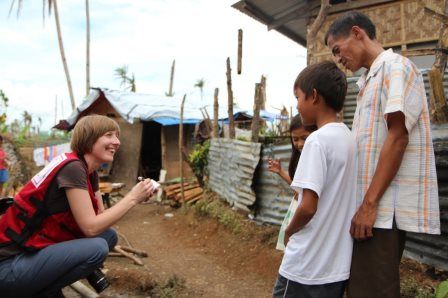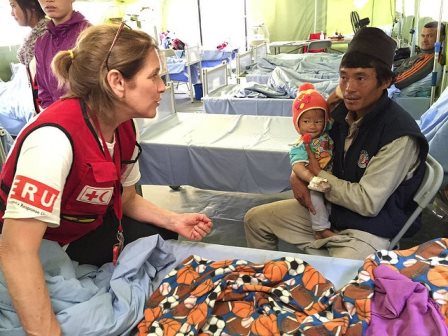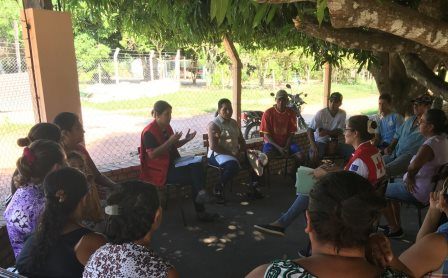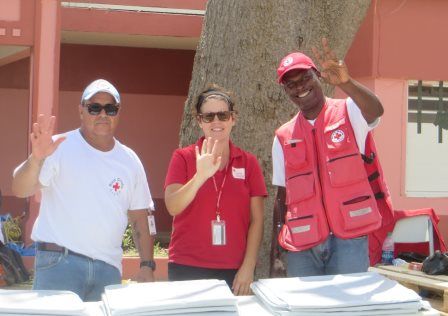More than 80 aid workers were in attendance, many having just returned from missions in Bangladesh, South Sudan and the Caribbean, among others. The energy in the room was magnetic.
In particular I was inspired to see so many women in the group. Forty-five of the 80 participants were women and their profiles ranged from operations managers, to nurses and doctors, administrators, communicators and psychosocial workers, and they have all contributed to alleviating the suffering of the most vulnerable people around the world.
I was lucky enough to catch up with four of these women to learn about how they got involved with the Red Cross, why they think the work we do is so important, and what some of the challenges are that they face in the international humanitarian field as women. Here’s what they had to say.
Nicole Robicheau, Communications and Operations

Why do you believe in the work of the Red Cross?
I strongly believe in the fundamental principles and the work the Red Cross does to alleviate human suffering throughout the world. I love that no matter where I go in the world, I’m working with local Red Cross volunteers, who are always the first responders to any disaster in their communities.
What are the challenges faced in being a woman in the humanitarian field?
Sometimes you find yourself in cultures where there are certain cultural norms in terms of how women should act, dress and who they can interact with. For example, as a communications delegate, you want to talk to people and tell their stories, but sometimes it’s not culturally acceptable to talk to men. So this can be challenging.
Denyse Bourgault, Psychosocial Aid Worker

How did you get involved with the Red Cross?
I got involved with the Red Cross in 2009 after a friend told me they were now recruiting social workers for the field hospital deployments. I have been interested in humanitarian work since I graduated from my Masters in Social Work, but there was never the right opportunity. I guess I was waiting for this.
Why do you believe in the work of the Red Cross?
I love being part of the Red Cross movement, it fits so closely with my values. I admire the work and the commitment I hear from delegates and am always impressed by the work I hear about. I’ve been with the Red Cross since 2009 and have deployed eight times. I love doing this work and feel quite privileged to be part of it.
Nazira Lacyo, Coordinator, Americas

How did you get involved with the Red Cross?
When I was growing up I always admired the work of the Red Cross and as a student in college I was a walk-in volunteer with them when they needed support after major disasters in Nicaragua. Then in 2014 I had the opportunity to join the Red Cross Movement as Project Coordinator in the Americas Regional Office.
What are the challenges faced in being a woman in the humanitarian field?
This has been a field that up until a few years ago was dominated mostly by males. The key challenge has been to change people’s preconceptions and realize that you should be given the same opportunities and are entitled to receive equal treatment as men. I think as a female you bring an added value to any intervention because you are able to give a different perspective on key issues and how disasters affect people differently.
Pamela Riley, Operations Manager

Why do you believe in the work of the Red Cross?
There is so much strife in the world and the Red Cross works in areas where no one else will go - we really do reach the most vulnerable. Although we are a large organisation that has influence at a high level in the humanitarian sphere, we really do work at the grassroots with our amazing volunteers. We also work to build the capacity of the local Red Cross Red Crescent Societies, so they are more resilient in the face of future disasters and are empowered to respond. For me, this is very important and more sustainable over the long term.
What are the challenges faced in being a woman in the humanitarian field?
In many parts of the world the societies are dominated by men, so women take a back seat in decision making. I think in these contexts it can be strange for them to see women in positions of leadership. However, I can't say that this has negatively impacted me in the field. If anything, I think I have been able to influence how women are perceived in their own communities. By acting as a role model and also an advocate for their rights I have helped to empower women to take a more active role in their communities and at home. I have also found that once men see the value of having their wives in our trainings and other work they support them.
These four women have been on close to 35 missions combined and I think it’s safe to say they will continue to make a positive impact here in Canada and around the world.
The Delegate Engagement Event was essential in bringing together aid workers to share their learnings, the latest trends, best practices and challenges from their unique experiences in the field, which ultimately will ensure we are deploying professional experts into any given context. It also allowed them to develop a network amongst their peers. This was made possible in part thanks to support from the Government of Canada.

